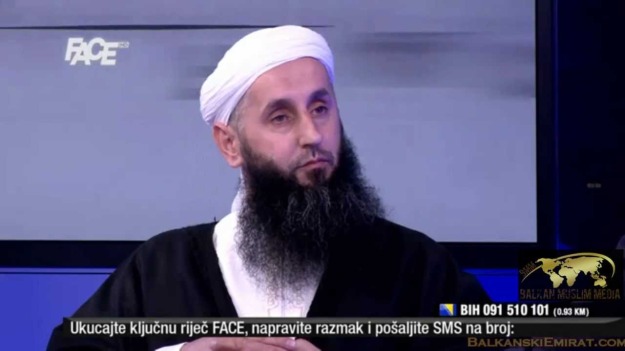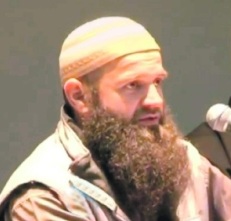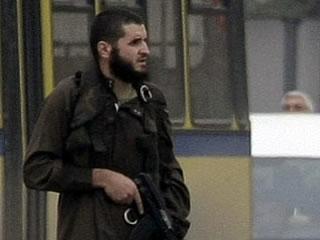By Kyle Orton (@KyleWOrton) on October 14, 2014
A week after the American-led airstrikes inside Syria began, it was reported that two women from the Balkans, Dora Bilic and Fatima Mahmutović, had been hit in ar-Raqqa, and that Ms. Mahmutović had been killed. Ms. Bilic, born in Croatia, converted to Islam two years ago and moved to Gornja Maoca, north-east Bosnia, which is in effect a Wahhabi commune, where she met her husband with whom she travelled to Syria for jihad. Ms. Mahmutović is from a village in Bosnia not far from the infamous Srebrenica, and she moved herself and her young son to Syria late last year. As is so often the case, it seems that the Croatian intelligence services were aware of Ms. Bilic but had done little about it. Even less surprising was the follow-up report that Ms. Bilic had been radicalised in London.
As to why Salafi-jihadists had their wives inside Syria, it relates to an underappreciated aspect of this jihad in the Fertile Crescent: the extent to which the Islamic State is engaged in settler-colonialism. The I.S. believes only in the umma (community of believers), and thus sees no contradiction in railing against foreigners interfering in “Muslim” affairs while its fighters transport their wives and children into Syria. The colonialism is as aggressive as, say, the Nazis in Ukraine: Syrians, especially Christians, in Raqqa have seen their homes and all its contents handed over to foreign Salafi-jihadists. The wives of the foreign holy warriors, especially the Western women, have also formed a network of informants for the I.S. Police State called “al-Khansaa Brigade“. As in so many things, the I.S. and the regime are two sides of the same coin: the only reason the I.S., “a group external to Syrian society” and run by foreigners, has been able to hold so much territory is by taking advantage of the Assad regime having shattered Syrian society and then mimicking the regime’s tactics of manipulating the rivalries in this fragmented society, buying-off sections of the society with oil money the regime gives I.S., and brute force.
Kosovo, one of the most sternly secular and pro-Western States in the Balkans, has nonetheless had problems related to jihadism. Kosovar jihadists had been behind the 2007 Fort Dix plot to massacre U.S. soldiers, the 2011 shooting down of two U.S. soldiers in Frankfurt, and the January 2012 plan for bombings in Tampa. The Syria-related problems first surfaced publicly in a major way in November 2013 when seven men were rounded up with weapons and explosives in Priština. The ringleader of the group was Genc Selimi (a.k.a. Abu Hafs al-Albani), a man who had been to Syria on jihad. In March 2014, a Kosovar Albanian named Blerim Heta blew himself up in Baghdad, slaughtering fifty people. The family professed themselves shocked, and (though there is evidence they ignored the warning-signs) they had every right to be: Heta’s family was intact and he had no criminal history. He had been radicalised by Shefqet Krasniqi, the popular imam at Priština’s Grand Mosque. In mid-August, the Peshmerga killed Lavdrim Muhaxheri, who had not only worked for KFOR but NATO in Afghanistan. Muhaxheri had publicly beheaded one of the many Alawites used as human shields by the Bashar tyranny.
While Macedonia has had problems, Bosnia has been the most troubled regional State. In September 2013, Dervis Halilovic Omar of Zenica and Emedin Velic (Musena) from Sarajevo were killed waging jihad in Syria. Velic had been pictured alongside Bajro Ikanović, who was sentenced for terrorism in Bosnia in 2007. Another Bosnian, Sanad Kabash al-Bosni, was reported cut down the next month. By December 2013, between eighteen and sixty Bosnians were in Syria, though this was a conservative estimate—and the number of foreign Salafi-jihadists who had entered Syria from Bosnia was much higher still. By April 2014, 150 Bosnians were said to be waging jihad in Syria and Iraq. On August 7, a Bosnian named Emrah Fojnica blew himself up in a crowded market in Baghdad, murdering twenty-four civilians, including eleven women and six children. Rather more alarming even than the fact that Fojnica was known to Bosnian intelligence for his role in the October 2011 attack on the U.S. Embassy in Sarajevo, and that he had been acquitted of terrorism charges for reasons inexplicable, was the fact that Fojnica’s father, Hamdo Fojnica, celebrated his son’s crime. Terrorism by Bosnians (especially in Bosnia) is highly unusual because, as John Schindler explains, the jihadists see Bosnia as a “staging base”—controlling areas like Gornja Maoca and Bocinja Donja where recruits can be radicalised and trained—and terrorism “brings unwanted scrutiny“.
Wahhabism was brought to Bosnia from outside during the 1992-5 war, but this ideology now has a local presence. State weakness, corruption, sympathisers in high places, and the intelligence infrastructure of foreign powers that introduced the ideology in the first place mean that Wahhabism has only grown in strength since 1995. There is an argument about the sympathies of the Bosnian government and its ruling party in this matter—and the truth of it seems to be that that party is much more supportive of Islamism than anybody wants to admit—but there is also a more human fact: the holy warriors were the only people who came to help Bosnia as the West watched on for forty months.
The jihadists did not make much military difference—indeed they helped discredit the cause with war crimes and the Bosnian Army nearly came to a shooting war with the zealots to try to get them under control—but they got a lot of points for effort. And their effects live on, not least because to this day many remain in Bosnia. The most direct impact can be seen in places like Zenica, which was a gathering-point for the foreign jihadists during the war and is now a centre of militancy; at least six of the village’s inhabitants were in Syria by the end of April. Travnik was another such town, though Travnik seems to have gotten rid of most of these people. The holy warriors who came to Bosnia during the war were nearly all Arabs and most from Afghanistan; they received a lot of support from Saudi Arabia, some of it direct, some of it indirect. Worse, the decades-long contest between Clerical Iran and the Saudis played out in Bosnia, with each side trying to outbid the other in its spread of fanaticism. Iranian intelligence, for example, was heavily involved—via Croatia, as it happens—in funnelling weapons and men to the Salafi-jihadists in Bosnia during the war.
Bosnia passed a law in April forbidding its citizens to engage in jihad abroad; by June there had been something less than a stringent crackdown. More than fifty jihadists were believed to have returned to Bosnia—complete with their holiday snaps and videos from Syria and Iraq brazenly displayed on their Facebook pages—and the authorities hadn’t even interviewed them. This stood in contrast to Priština, which almost dismantled the Salafi-jihadist infrastructure in Kosovo in early August, arresting forty people (the relative equivalent of 1,400 in Britain). Further arrests followed in mid-September, including Shefqet Krasniqi, head of Priština’s Grand Mosque. The ambiguity of Kosovo was perhaps best expressed today by the news that a pair of Kosovar Albanian brothers were on opposing sides in Syria: one a U.S. Air Force pilot; the other a jihadist. Bosnia eventually launched Operation DAMASCUS on September 3, which rounded up sixteen men, including Bilal Bosnić and Hamdo Fojnica. It wasn’t all that could have been hoped for—seven men, Fojnica among them, were immediately released—but it was a start.
Bosnić is the leader of the pro-Islamic State wing of Balkan jihadism; the leader of the pro-Jabhat an-Nusra (al-Qaeda) faction is Nusret Imamović.
Imamović had led the Gornja Maoca commune, which produced Mevlid Jašarević, who is currently imprisoned for the 2011 Embassy attack. The only other significant terrorist act in Bosnia—the blowing up of a police station in Bugojno, near Zenica and Travnik, which killed one person—was linked to Imamović. Imamović has been arrested and charged for his activities, but, as so often, was then released. Imamović moved to Syria early in the summer with his wife and four children. The Bosnian and Kosovar networks cross over via Sulejman Bugari, a Kosovo Albanian–born imam at the White Mosque in Sarajevo, who is “a go-between for Albanian and Bosnian extremists“.
When Bosnić was arrested at his farm near Buzim, he was with his four wives, sixteen children, and “guests,” who had apparently stopped by for religious instruction. In a near-incredible story, Bosnić had been an accordion player in a folk band, but since he took up religion he ostensibly earns his living from tending goats. It is safe to say almost nobody believes this: Bosnić is widely suspected of receiving foreign funds, probably through Iranian intelligence. The part of Bosnić’s biography to watch is his time spent in Italy, a major if underreported facilitation hub for the Salafi-jihadists, and Vienna, Austria, looking for recruits.
Austria has done a masterly job of keeping this on the down-low, but with the exception of London, Vienna is the largest hub of Salafi-jihadism in the West. The problem can be summarised this way: Austria’s most notorious Salafi-jihadist mosque is across the road from a major military base, Stiftskaserne, in the capital. “It’s an exceptional terrorist or Salafi radical in Bosnia who has not spent some time in Austria,” Schindler notes. Jašarević, for example, had been born in Serbia but grew up and was radicalised in Vienna. Vienna’s role in the global Salafi-jihadist network is raising, moving, and storing funds, and recruitment and radicalisation. Like Bosnia, terrorism on Austrian soil would defeat the point for the jihadists and also like Bosnia, Austria is close to Turkey, the favoured transit route for the jihadists to get to Syria. Unlike Bosnia, Vienna’s primary obstacles are very stringent laws. Vienna is not allowed to pay any attention to social media, for example, unless a court order has been obtained, and anything obtained in such an investigation has to be deleted after six months if no charges are brought. Austrian law also has an extremely restricted view of what constitutes terrorism, so facilitation, incitement, and financing are not counted.
Austria’s problem did briefly emerge in public in August when nine Chechens were arrested. Austria has 500,000 Muslim inhabitants (total population: 8.5 million), which includes 17,000 Chechens, the largest such concentration in Europe. As elsewhere—notably Jordan—this has caused problems. About half the holy warriors who emanate from Austrian territory come from the Caucasus. Austria’s Public Safety director has said that 130 people from Austria have gone to wage jihad in Syria and Iraq, and two-thirds of them have returned. Forty are Austrian citizens; the rest are from Russia, the Balkans, and Turkey.
There are now believed to be 3,000 European jihadists in Syria and Iraq. Most of them got there through these vast networks that at present move terrorists from inside Europe to the Middle East. One lesson of Syria is that such networks are easily reversible: the networks the Assad regime used to send Salafi-jihadists into Iraq flipped easily enough. The rule of thumb is that ten percent of returnees will engage in terrorism. Islamic terrorism originating in the Fertile Crescent has already hit European streets; it won’t be the last time. And to think, an early intervention to topple Bashar al-Assad could have denied the jihadists the space they needed to train our passport holders in using lethal violence against our civilians. Costly as action can be, inaction has consequences too.



Good, well researched article which I broadly agree with. I think that the Bosnian authorities have not done enough to stamp out Islamist terrorist cells in BiH, and to some extent have been in denial about the problem (partly because many feel it fuels Serbian nationalist propaganda). It (and Western governments) should take their example from the government of Kosovo, which took swift and effective action against them. IT has to be acknowledged that Islamic extremism is a real issue amongst the Muslim peoples of south-eastern Europe, and needs to be dealt with.
I do think it’s important to bear in mind throughout this that support for extremist Islam remains a fairly marginal phenomenon in the Balkans, as opinion polls and studies consistently show. Bosnia and Kosovo are far from being terrorist havens and hellholes like Afghanistan and Chechnya. The number of terrorists that have from these areas is much smaller than most western countries, and indeed many of the examples you cite and other prominent examples (such as the two Bosniak schoolgirls who went and joined ISIS), were perpetrated by people raised and educated in the West. I’m not entirely convinced that the lack of terrorist attacks in Bosnia is due to the fact that Jihadists do not want it to receive attention, as Schindler argues (but provides no evidence for). There are plenty of targets for Jihadists to attack in BiH if they really wanted to, and other supposed Jihadist ‘safe havens’ such as Afghanistan and Pakistan face constant terrorist attacks.
I think it’s a bit too strong for you to argue that the (so called) Islamic State is engaged in settler colonialism, and it’s certainly too much to argue that it is equivalent to Nazi Lebensraum ideology in Ukraine, which resulted in the deaths of millions of people and the ethnic cleansing of millions more. The number of foreign salafis who have traveled to ISIS is too small, and it doesn’t seem to be a part of their ideology, I haven’t seen any settler-colonialist rhetoric in ISIS propaganda. The activities you describe seem to be largely a by product of ISIS’s extra-territorial pan-Islamic rhetoric and the subsequent presence of foreign salafis, rather than any deliberate, systematic settler-colonialist program on ISIS’s part.
And finally in BiH I think it’s important to maintain a distinction between Saudi influence and Iranian influence. Iranian efforts have been almost wholly focused on two matters:
1. arms through Croatia during the war (which was, in my view, fully justified in the circumstances)
2. ties to Bosnian intelligence
The Iranian influence, while a nuisance, is in no way as toxic as the Saudi one which has seen a boom in mosque construction (along Saudi lines, diametrically opposed to traditional Ottoman design) with the cultural effect that comes with it in the spread of Salafist ideas by way of Madrassas and other educational institutions funded by those same Saudis.
LikeLike
I think we have differences of emphasis more than differences on strict facts. The point in mentioning the Vienna (and, as always, London) connection was exactly to say that this is not just a Balkans problem—and in relative or absolute terms Britain’s problem with Salafi-jihadism is much worse than Bosnia’s.
Bosnia and Kosovo are of course nothing like Afghanistan and I didn’t even mean to imply anything close to that. (I’ve been to Bosnia and very much intend to go to Kosovo; I do not intend to go to Afghanistan at any foreseeable point.)
On the I.S. colonialism point, I wouldn’t lean on the Nazi analogy more than it will bear, but I meant to make two points. One was the unusual form of colonialism: literally throwing people out of their homes, not allowing them to take any belongings, and then moving a foreign family in: there aren’t too many examples of this. The other point was that while this indeed fairly limited to the I.S.’s so-called capital in Raqqa at present, the I.S. colonialism is not of a classic kind in their self-perception because they don’t see themselves as colonists: this is “Muslim land” and they are Muslims, so it is their home. I meant to draw attention precisely to the absurdity of these people from half a world away in stolen Syrian homes railing against “Crusader interference”.
On Iran and Saudi Arabia in Bosnia, I agree on the weapons shipments (and indeed think the jihadists would never have made such inroads if we helped earlier.) Agree that the Saudis’ cultural vandalism is more intrusive than what Iran has done. Beyond that it’s quite a lot of guesswork: there is if you like the known-unknowns of the scale of Iranian espionage in Bosnia and exactly what it is used for, and there are also some unknown-unknowns that are sure to surprise us all, but which are never good when it comes to Iran.
LikeLike
Pingback: The Long History of Middle Eastern State-Terrorism In Paris | The Syrian Intifada
Pingback: Mohammed Emwazi’s Path To The Islamic State | The Syrian Intifada
Pingback: Obama BFF Alert: Turkey fears a Kurdistan more than the Islamic State | American Infidels
Pingback: How Russia Manipulates Islamic Terrorism | The Syrian Intifada
Pingback: Jak Rosja manipuluje islamskim terroryzmem | Zenobiusz
Pingback: How Russia Manipulates Islamic Terrorism | Zenobiusz
Pingback: Turkey Fears A Kurdish State More Than The Islamic State | The Syrian Intifada
Pingback: Black Flag of the Pacific: Unification of Pro-IS Groups in SE Asia - Independent Strategy and Intelligence Study GroupIndependent Strategy and Intelligence Study Group
Pingback: From Bosnia to Guantanamo | The Syrian Intifada
Pingback: Another Legacy of the Bosnian Jihad | The Syrian Intifada
Pingback: Coalition Targets Islamic State Recruiters and Terrorism Planners | The Syrian Intifada
Pingback: Mohammed Emwazi's Path To The Islamic State | Kyle Orton's Blog